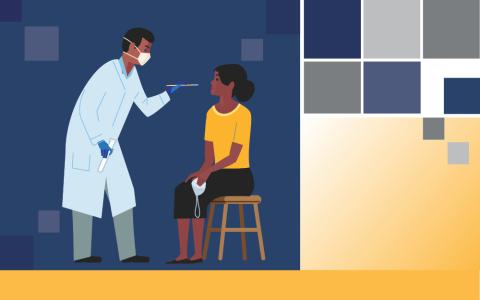COVID-19 Vaccines and Reproductive Health
If you are planning to become pregnant or are pregnant now, you may have questions about how to keep yourself and your baby safe from COVID-19.
The most important thing you need to know is that research shows COVID-19 vaccines are safe and do a good job stopping serious illness and death from COVID-19 for people who are trying to get pregnant, are already pregnant, or who are breastfeeding.
This fact sheet answers common questions about COVID-19, vaccines, and pregnancy. It also has information about vaccines and reproductive health.

Does being pregnant put me or my baby at greater risk for the effects of COVID-19?
Yes. Although the overall risks are low, people who are pregnant or were recently pregnant are more likely to get very sick or even die from COVID-19. A COVID-19 infection when pregnant can also affect your baby. For example, COVID-19 infection can cause a baby to be born too early.
The story How COVID-19 affects pregnancy has more information about the impacts of COVID-19 on people who are pregnant and their babies.
Are vaccines safe for people who are pregnant?
Yes. There are now many research studies showing that COVID-19 vaccines are safe and protect people during all phases of their pregnancy. Research also shows that the vaccine does not increase pregnancy problems. In addition, possible vaccine side effects in people who are pregnant are the same as for people who are not pregnant.
Researchers have also looked at babies born to people who had two doses of an mRNA-based vaccine (Pfizer-BioNTech or Moderna) while pregnant. These babies were less likely to get really sick from or be hospitalized with COVID-19.
The story COVID-19 vaccination during pregnancy likely benefits moms and babies has more information.
Is it true that the vaccine may cause infertility or put pregnancies at risk?
Getting a COVID-19 vaccine can help protect you from serious health problems caused by COVID-19. If you are planning to become pregnant, stay up-to-date on your COVID-19 vaccines, including booster shots.
If you haven’t been vaccinated against COVID-19 yet, do it now. Being as healthy as possible before and during pregnancy is important for you and the health of your baby.
Can the vaccines affect my menstrual cycle?
Maybe. Scientists are still learning about how the menstrual cycle might change when the body’s immune system responds to any vaccine. Some vaccines, like those for hepatitis B and HPV, have shown some short-term effects on menstruation.
Researchers are looking at changes in menstruation, pain, and other symptoms after getting a COVID-19 vaccine. One study found that a small number of women experienced a slight increase in the length of their menstrual cycle (less than one day during the month they were vaccinated). However, the same study showed that menstruation soon returned to normal, which means that any effect from the vaccine didn’t last long. Another study showed that menstrual cycle changes were more common among those who are older and those who had pregnancies or given birth before.
You can read more about this in the NIH article COVID-19 vaccines and the menstrual cycle.
Published: February 20, 2023
Spanish Version: Vacunas contra el COVID-19 y la salud reproductiva
Last updated: August 8, 2024